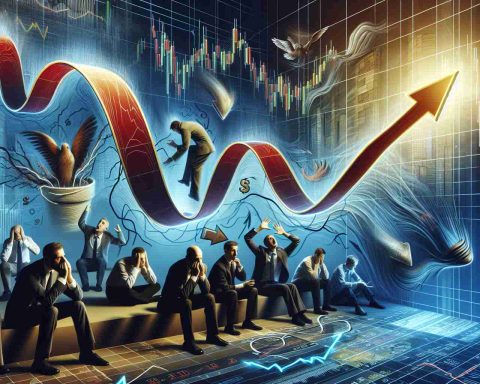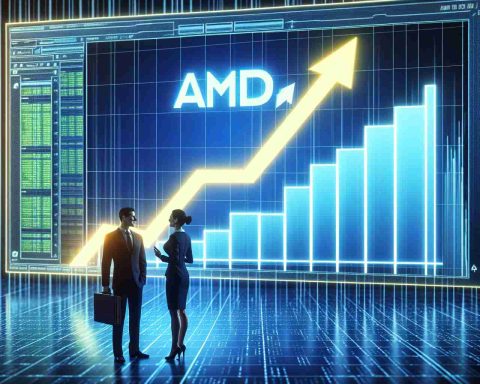As investors keep a close eye on upcoming earnings reports and significant political developments, Wall Street turns cautious. With the inauguration of President-elect Donald Trump looming on January 20, traders are pondering the potential impact of his proposed trade tariffs, especially towards China.
The current earnings season has become a focal point, with notable performances from banks easing some concerns. However, major technology and consumer giants are gearing up to disclose their financial results next week, making market watchers anxious.
Despite a slight dip in futures for the S&P 500, Nasdaq, and Dow Jones, investor sentiment has been affected by fluctuating inflation data. Although weak inflation numbers initially provided reassurance, robust consumer spending and a strong labor market signal that the Federal Reserve might proceed carefully with interest rate cuts.
One prominent story making headlines is Apple Inc., which recently lost its title as the top smartphone vendor in China to competitors Vivo and Huawei. This shift, driven by a noteworthy 17% drop in Apple’s shipments in the region, indicates fierce competition. The absence of artificial intelligence features in Apple’s devices further dampens its sales prospects in China.
Adding to the anxiety in tech circles, concerns over potential U.S. restrictions on chip exports have surfaced, raising alarms for major chipmakers. Despite a solid performance by TSMC, the broader technology sector remains wary as the markets brace for what lies ahead.
The Broader Implications of Tech Competition and Trade Policies
As Wall Street navigates the turbulent waters of political uncertainty and fluctuating markets, the impact on society and the global economy could be profound. The proposed trade tariffs might create immediate disruptions in international trade flows and relationships, particularly between the U.S. and China, two titans of the global economy. Increased tariffs could lead to higher consumer prices and may compel companies to reconsider their supply chains, opting for alternative manufacturing locales in Southeast Asia or even within the U.S. This shift could reshape global trade dynamics and enhance the importance of newer markets.
The competitive landscape in technology is also changing, with companies like Vivo and Huawei challenging established players like Apple. This fierce competition encourages innovation and diversification within the tech sector, potentially leading to more options for consumers and a faster pace of technological advancements. However, as Apple struggles to maintain its flagship status in China, the ramifications extend beyond market shares; they touch on cultural perceptions of brands and consumer loyalty in a rapidly evolving digital age.
Looking ahead, this competition and the geopolitical climate could catalyze significant environmental considerations. An increased focus on domestic sourcing may lead to both positive and negative consequences for sustainability practices, while the demand for innovation in tech could drive investments in greener technologies. Over the long term, the intersection of trade policy, tech rivalry, and environmental responsibility will be pivotal in shaping a more interconnected and resilient global economy.
Wall Street’s Cautious Response: Earnings, Trade Policies, and Tech Challenges Ahead
As Wall Street navigates a complex landscape marked by significant political developments and upcoming earnings reports, investor sentiment remains cautiously optimistic. The potential impact of trade policies under President-elect Donald Trump, particularly concerning tariffs on imports from China, has traders speculating about the future of markets.
Current Market Landscape
The ongoing earnings season is at the forefront, with banks delivering stronger-than-expected results that have eased some apprehensions. However, the focus shifts next week to major technology and consumer goods companies, as they prepare to unveil their quarterly results. This creates a sense of anxiety among market watchers, especially given the pressure these sectors face from both competition and regulatory changes.
Economic Indicators and Investor Sentiment
Recent fluctuations in inflation data have influenced investor sentiment. Initially, weak inflation numbers provided solace; however, rising consumer spending and a robust labor market suggest that the Federal Reserve may adopt a more cautious approach to interest rate adjustments. This duality reflects the complexity of the current economic environment and the challenges ahead for policymakers.
Apple Inc.’s Market Struggles
A notable shift occurred in the smartphone market, as Apple Inc. lost its position as the leading vendor in China to competitors such as Vivo and Huawei. A significant 17% decline in Apple’s shipments highlighted the increasing competitiveness of local brands, which are rapidly gaining ground in features like artificial intelligence—an area where Apple has been perceived as lagging. This competitive pressure raises questions about Apple’s ability to regain its market share and adapt its product offerings to meet local demand.
Concerns Over U.S. Chip Export Restrictions
Adding to the uncertainty in the technology sector are concerns regarding potential U.S. restrictions on chip exports. Major chipmakers are bracing for the impact of these regulatory changes, which could constrain access to critical markets. Despite TSMC’s robust performance, the broader technology industry remains on edge, anticipating shifts that could reshape their operational frameworks.
Looking Ahead: Trends and Predictions
1. Trends in Technology: Companies like Apple must innovate rapidly to reclaim their market positions while contending with fierce competition from local manufacturers.
2. Impact of Trade Policies: Potential trade tariffs could lead to increased costs for consumers and manufacturers, impacting the overall market structure.
3. Regulatory Developments: Ongoing discussions about chip export regulations could define the future of tech manufacturing and innovation in the U.S.
Pros and Cons of Current Market Initiatives
Pros:
– Strong earnings in the banking sector provide a buffer against broader market volatility.
– Adaptation of technology firms to local consumer preferences can foster innovation.
Cons:
– Trade uncertainties may lead to economic slowdowns.
– Heightened competition in the tech sector requires companies to differentiate their products effectively.
Conclusion
As Wall Street prepares for a pivotal earnings week, the confluence of political, economic, and competitive factors will play a crucial role in shaping market directions. Investors must stay attuned to developments in trade policies, technological innovation, and consumer behavior, as these elements will significantly impact the financial landscape in the coming months.
For more insights on market trends, visit MarketWatch.


















